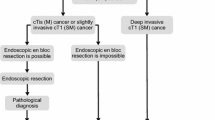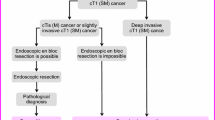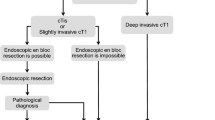Abstract
Surgery, chemotherapy and radiotherapy have been the mainstay of colorectal cancer treatment. There is however current intense research on traditional Chinese medicine (TCM) as novel or additional treatment methods for colorectal cancer. This article reviews the current use of TCM in colorectal cancer so as to increase the awareness of colorectal surgeons. The pathogenesis of colorectal cancer according to TCM is discussed. TCM has been used successfully during the perioperative period to relieve intestinal obstruction, reduce postoperative ileus and reduce urinary retention after rectal surgery. Good results have been reported in the treatment of the complications of chemotherapy and radiation enterocolitis. Favourable results have also been shown in the use of TCM either alone or in combination with chemotherapy to treat advanced colorectal cancer. Molecular studies have shown some TCM compounds to reduce tumour cell proliferation and induce apoptosis. Although the reported results of TCM have been exciting thus far, problems of lack of consensus on treatment regimes and questions on the reliability, validity and applicability of published studies prevent its widespread use. There is now an urgent need for colorectal surgeons to work with TCM physicians in the continuing research on this 6000-yearold art so as to realize its full potential for our patients.
Similar content being viewed by others
References
Tjandra JJ, Kilkenny JW, Buie WD et al (2005) The Standards Practice Task Force; The American Society of Colon and Rectal Surgeons. Practice parameters for the management of rectal cancer (revised). Dis Colon Rectum 48:411–423
Huang Di Nei Ching (The Canon of Internal Medicine)
Peng B (2003) Chinese medicine treatment as intervention for acute cancerous colon obstruction. Beijing Zhongyi 22:25
Zhou YL (2004) Colon cancer and acute intestinal obstruction. Treatment of 30 patients with Chinese medicine. Fujian Med J 26:158
Chuang QH (1998) Chinese medicine treatment of post-operative ileus. J Practical Traditional Chinese Med 14:29
Dong WH, Zhan LY, Chen F (2003) The aetiology and management of acute urinary retention after rectal surgery. Xiandai Zhong Xi Yi Jiehe Zhazhi 12:2082–2083
Mao XL, Huang M (2005) Clinical trial of the use of TCM to reduce side-effects of post-operative chemotherapy in colon cancer patients. Shandong Zhongyixue Daxuexuebao 29:128–129
Jing J, Zhang MZ (2005) Clinical trial on Da An Wan reducing post colonic surgery chemotherapy nausea and vomiting. Zhongguo Zhongyiyao Newsletter 9:823–824
Zhang WY (2004) TCM (fuzhengpeiben method) aids chemotherapy in 47 patients. Zhongyiyao Lingchuang Zhazhi 16:117–118
Zhang LH, Fei GD (2001) Clinical study on fuzhengpeiben used preoperatively in 24 patients. Anhui Zhongyi Clin J 13:95–96
Wang ZH, Guan WJ (2004) Clinical results of using TCM in treating chemotherapy related nausea. Shiyongquanke Yixue 2:254
Ding XF, Li DX, Zhao L (2004) Clinical study of TCM on the treatment and prevention of radiation related bowel injury. Zhonghua Fangse Yixueyifanghu Zhazhi 24:49–51
Ding XF, Li DX, Zhao L (2003) Rat study on the mucosa and nitric oxide levels of irradiated bowel after treatment with TCM. Zhongguo Xiandai Yixue Zhazhi 13:42–44
Hu AM, Jie FY (2006) Results of combining TCM with chemotherapy in advanced colorectal cancer. Shiyongaizhen Zhazhi 21:74
Zhang Y, Yang Y (2003) Combination of chemotherapy and TCM enema in the treatment of advanced colorectal cancer. Hubei Zhongyi Zhazhi 25:34
Wang ZX (2001) Results of using jianpixieshijiedu soup before the commencement of infusional chemotherapy. Beijing Zhongyi 20:36
Cha XL (1997) The use of qingchangjiedu soup in the treatment of 24 patients with advanced colorectal cancer. Jiangsu Zhongyi 18:20
Chen PF (1995) TCM in the management of 18 patients with advanced colorectal cancer. Jiangxi Zhong Yi 16:12
Ye J, Jiang H, Zhou JW et al (2002) Tea polyphenol inhibits colorectal cancer and reduces microsatellite instability. Huaxueyi Weizhuanxue Zhazhi 19:190–192
Zuo HJ, Li D, Zheng W et al (2005) The chemical composition of Rabdosia rubescens and its effect on tumours. Shenyang Yikedaxue Xuebao 22:258–261
Author information
Authors and Affiliations
Corresponding author
Rights and permissions
About this article
Cite this article
Tan, K.Y., Liu, C.B., Chen, A.H. et al. The role of traditional Chinese medicine in colorectal cancer treatment. Tech Coloproctol 12, 1–6 (2008). https://doi.org/10.1007/s10151-008-0392-z
Received:
Accepted:
Published:
Issue Date:
DOI: https://doi.org/10.1007/s10151-008-0392-z




